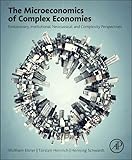The microeconomics of complex economies: evolutionary, institutional, neoclassical, and complexity perspectives
Material type: Computer fileOriginal language: English Publisher: Ámsterdam ; Elsevier ; 2015Description: 566 pISBN: 978-0-12-411585-9Subject(s): Microeconomía | Negocios y economía | Teoría económicaLOC classification: HB/172/E58/2015
Computer fileOriginal language: English Publisher: Ámsterdam ; Elsevier ; 2015Description: 566 pISBN: 978-0-12-411585-9Subject(s): Microeconomía | Negocios y economía | Teoría económicaLOC classification: HB/172/E58/2015Contiene: 1. Introduction to the Microeconomics of Complex Economies.- 2. Tools I: An Introduction to Game Theory.- 3. Problem Structures and Processes in Complex Economies.- 4. Approaching Real-World Interdependence and Complexity: Empirical Phenomena in the Global Economy*.- 5. The Ideal Neoclassical Market and General Equilibrium*.- 6. Critiques of the Neoclassical “Perfect Market” Economy and Alternative Price Theories*.- 7. Real-World Markets: Hierarchy, Size, Power, and Oligopoly, Direct Interdependence and Instability.- 8. Tools II: More Formal Concepts of Game Theory and Evolutionary Game Theory.- 9. Tools III: An Introduction to Simulation and Agent-Based Modeling.- 10. A Universe of Economies: Interdependence and Complexity, System Trajectories, Chaos, and Self-Organization*.- 11. Dynamics, Complexity, Evolution,and Emergence—The Roles of Game Theory and Simulation Methods.- 12. Themes of Complexity in the History of Economic Thought: Glimpses at A. Smith, T.B. Veblen, J.A. Schumpeter, and Others.- 13. Recent Core Models of Complexity Microeconomics*.- 14. The Size Dimension of Complex Economies—Towards a Meso-Economics: The Size of Interaction Arenas and the Emergence of Meso-Platforms of Institutional Coordination*.- 15. The Information Economy and the Open-Source Principle.- 16. Networks and Innovation—The Networked Firm, Innovation Systems, and Varieties of Capitalism. 17. Policy Implications: New Policy Perspectives for Private Agents, Networks, Network Consultants, and Public Policy Agencies*.

There are no comments on this title.